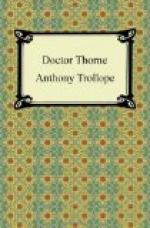And then, if these two men did die within the prescribed period, if this clause of Sir Roger’s will were brought to bear, it should become his, Dr Thorne’s, duty to see that clause carried out, how would he be bound to act? That woman’s eldest child was his own niece, his adopted bairn, his darling, the pride of his heart, the cynosure of his eye, his child also, his own Mary. Of all his duties on this earth, next to that one great duty to his God and conscience, was his duty to her. What, under these circumstances, did his duty to her require of him?
But then, that one great duty, that duty which she would be the first to expect from him; what did that demand of him? Had Scatcherd made his will without saying what its clauses were, it seemed to Thorne that Mary must have been the heiress, should that clause become necessarily operative. Whether she were so or not would at any rate be for lawyers to decide. But now the case was very different. This rich man had confided in him, and would it not be a breach of confidence, an act of absolute dishonesty—an act of dishonesty both to Scatcherd and to that far-distant American family, to that father, who, in former days, had behaved so nobly, and to that eldest child of his, would it not be gross dishonesty to them all if he allowed this man to leave a will by which his property might go to a person never intended to be his heir?
Long before he had arrived at Greshamsbury his mind on this point had been made up. Indeed, it had been made up while sitting there by Scatcherd’s bedside. It had not been difficult to make up his mind to so much; but then, his way out of this dishonesty was not so easy for him to find. How should he set this matter right to as to inflict no injury on his niece, and no sorrow to himself—if that indeed could be avoided?
And then other thoughts crowded on his brain. He had always professed—professed at any rate to himself and to her—that of all the vile objects of a man’s ambition, wealth, wealth merely for its own sake, was the vilest. They, in their joint school of inherent philosophy, had progressed to ideas which they might find it not easy to carry out, should they be called on by events to do so. And if this would have been difficult to either when acting on behalf of self alone, how much more difficult when one might have to act for the other! This difficulty had now come to the uncle. Should he, in this emergency, take upon himself to fling away the golden chance which might accrue to his niece if Scatcherd should be encouraged to make her partly his heir?
’He’d want her to go and live there—to live with him and his wife. All the money in the Bank of England would not pay her for such misery,’ said the doctor to himself, as he slowly rode into is own yard.
On one point, and one only, had he definitely made up his mind. On the following day he would go over again to Boxall Hill, and would tell Scatcherd the whole truth. Come what might, the truth must be best. And so, with some gleam of comfort, he went into the house, and found his niece in the drawing-room with Patience Oriel.




